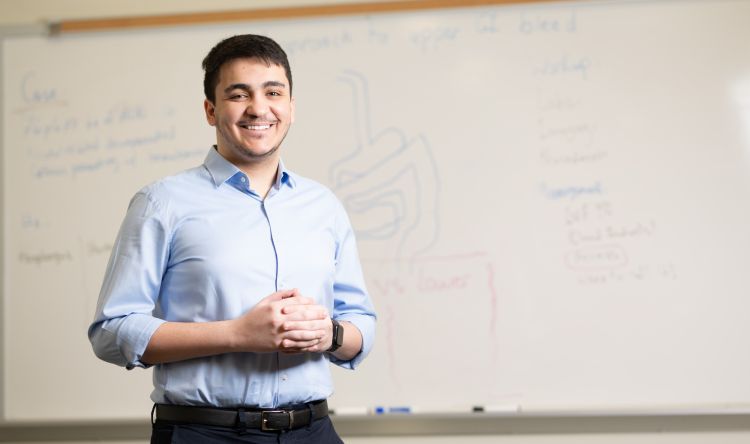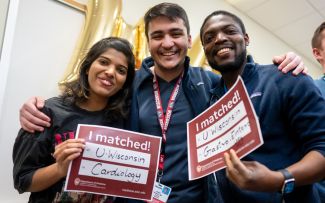Rising Chief Resident Dr. Mazen Almasry to pilot a curriculum for first-year international medical graduates

When Mazen Almasry, MBBS, moved from Saudi Arabia in 2020 to start his internal medicine residency at the University of Wisconsin Department of Medicine (DOM), he was not just one of five international medical graduates (IMGs) in his cohort—he was part of the largest single IMG cohort recruited to the program in its decades-long history. It was the start of a new chapter.
“Everything was new for everyone,” says Dr. Almasry of those first uncertain days.
He recalls the then-interim program director, Jeremy Smith, MD, professor, General Internal Medicine, inviting the five IMGs to dinner at his home in their first week. “You are part of the Smith family now, he said to us. And within a few months, the entire department felt like our family.”
Since then, the program has added IMGs with each match and expanded its social and academic support for international students. Dr. Almasry credits leaders like Dr. Smith and current program director Andy Coyle, MD, associate professor, General Internal Medicine, as major factors in the ongoing improvements.
But it is largely thanks to the efforts of Dr. Almasry—who is about to start his appointment as the department’s first IMG chief resident—that this fall, first-year IMG residents in DOM and the UW Departments of Anesthesiology and Neurology will pilot a full curriculum designed to help them transition to life and medical education in the United States.
The growth of a small idea
The idea for the curriculum began small, as a basic resource guide to be given to IMGs at orientation.
“Everyone kept telling me to take it to the next level,” Dr. Almasry says.
With the help of his faculty mentor Andrea Schnell, MD, clinical associate professor, General Internal Medicine, he did just that: surveying his co-IMG residents and using their feedback to build a full curriculum, securing funding through a DOM Medical Education Innovation Grant, and—in December 2023—workshopping and refining the plan at the Harvard Macy Institute's Program for Post-Graduate Trainees: Future Academic Clinician-Educators.
"Mazen cares deeply for his co-residents," says Dr. Schnell. "He approached the curriculum with thoughtfulness and scholarship, and it shows."
The final curriculum will blend virtual and in-person components, including a communications workshop with simulated patients, electronic medical records training, peer-to-peer mentoring, and community-building events.
It will also be run entirely by DOM residents—nine out of the program’s 11 current IMGs are involved—who will collect participant feedback with each session and again six months after the curriculum is done.
“The goal is to make this a longitudinal project that comes back each year, better and better,” says Dr. Almasry. “Feedback is going to be critical.”
Looking back, looking ahead
“This resident-driven curriculum is a really important addition to the mentorship and support we provide IMGs,” says Dr. Coyle. “The remarkable individuals who have entered over the last few years have brought so many benefits to our program and community, but we know that moving to a new country to practice in a completely different medical system can be a huge adjustment.”

Of course, some of the challenges facing IMGs—language differences, visas, climate acclimation—will always exist to one degree or another.
“The first time I saw snow it was like I was on another world,” says Dr. Almasry with a laugh. “And I can’t even tell you how many times I’ve slipped and fallen because I’m not wearing the right boots.”
However, having helped the department develop a more inclusive culture in real time, he hopes future IMGs will not be discouraged from ranking programs in the United States.
“Just be mindful of the environment,” he advises. “There will be a transition period. It’s a lot easier if you find a place that will support you at every level, from the individual to the institutional, like UW–Madison has for us!”
Banner: Mazen Almasry, MBBS, PG-3, is deeply at home in the classroom. “I’ve always loved teaching medicine,” he says, having started with first- and second-year medical students in Saudi Arabia. Credit: Clint Thayer/Department of Medicine.
Editor's note: a previous iteration of this article misstated that Dr. Almasry was among the first IMGs to be admitted to the internal medicine residency program at the University of Wisconsin, which is not strictly true.